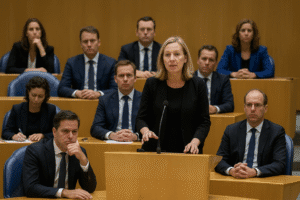A Government Unraveling: How the Gaza War Fractured Dutch Politics
The Netherlands’ caretaker government is fracturing under the pressure of its Israel-Gaza policy, culminating in the resignation of Foreign Minister Caspar Veldkamp. His departure, followed by his entire NSC party’s withdrawal, was a direct protest against the cabinet’s refusal to adopt tougher measures against Israel. This crisis exposes a deep national division, pitting unwavering alliance against moral outrage over Gaza’s humanitarian famine.
The political rupture leaves an already weakened administration, governing with minimal parliamentary support since June, dangerously adrift. Parliament’s rejection of proposals like an arms ban or settlement boycott highlights the struggle to translate ethical concerns into action. Consequently, the Netherlands’ ability to influence EU policy or navigate this geopolitically divisive issue is now severely compromised. This internal collapse underscores how the war in Gaza is destabilizing politics far beyond the Middle East.
A Government Unraveling: How the Gaza War Fractured Dutch Politics
In the hallowed halls of the Dutch parliament in The Hague, a foreign policy crisis thousands of miles away has triggered a domestic political earthquake. The Netherlands, a nation known for its pragmatic consensus-building and stable coalition governments, is watching its caretaker administration crumble under the weight of a single, intractable issue: its policy toward Israel and the war in Gaza.
The immediate casualty was Foreign Minister Caspar Veldkamp, a diplomat with deep regional expertise from his time as ambassador to Israel. His resignation on August 23rd was more than a personal departure; it was a stark admission of failure. Veldkamp, unable to secure cabinet backing for a tougher stance against Israel’s renewed military operations in Gaza City, chose to fall on his sword. His entire party, the New Social Contract (NSC), followed him out the door, withdrawing from the already fragile governing coalition.
This rupture exposes a profound and painful dilemma at the heart of Dutch—and indeed, European—politics: how to balance steadfast alliance, moral responsibility, and realpolitik in the face of a devastating humanitarian catastrophe.
The Breaking Point
Veldkamp’s resignation wasn’t a sudden impulse but the culmination of months of internal friction. As the humanitarian situation in Gaza worsened, the Foreign Minister reportedly found himself consistently constrained. Party leader Nicolien van Vroonhoven’s terse explanation—“The situation has to improve. It didn’t. So now steps are being taken”—hints at immense frustration behind closed doors. Deputy Prime Minister Eddy van Hijum was more direct, accusing unnamed coalition partners of constantly applying “the brakes” on proposed tougher measures.
The subsequent parliamentary debate laid bare the deep divisions. Lawmakers rejected a series of progressive proposals, including a settlement product boycott, an arms purchasing ban, and recognition of a Palestinian state. The debate revealed a nation wrestling with its conscience: Defence Minister Ruben Brekelmans argued pragmatically that an arms ban would harm Dutch military readiness, while opposition parties accused the government of dithering while civilians faced famine.
A Caretaker Government on Shaky Ground
The crisis is magnified by the government’s profoundly weakened state. This is not a full-powered administration but a caretaker government, running day-to-day affairs since early June when Geert Wilders’ Party for Freedom (PVV) walked out over a separate migration dispute.
That earlier collapse left Prime Minister Dick Schoof presiding over a rump cabinet with minimal parliamentary support—just 32 seats out of 150. The withdrawal of the NSC leaves it hanging by a thread, effectively rudderless in navigating one of the most complex geopolitical challenges of our time. The government is so beleaguered that the Prime Minister had to cancel a trip to Ukraine to manage the crisis at home.
The Deeper Value: What This Tells Us
This isn’t just a story of Dutch political instability; it’s a microcosm of a wider Western struggle.
- The Limits of Coalition Governance in a Crisis: The Dutch model of multi-party consensus is excellent for stability but can be paralyzing when swift, decisive action on a morally charged issue is demanded. The need to maintain a fragile coalition compromise prevented a clear, principled foreign policy from emerging, leading to its eventual collapse.
- The Shift from Unconditional Support to Conditional Pressure: The Netherlands is a traditional ally of Israel. However, its actions—halting direct arms exports, barring far-right Israeli ministers from entry, and supporting EU reviews of trade agreements—signal a significant, albeit reluctant, shift. This reflects a growing movement in Europe where historical alliances are being weighed against contemporary actions and international law.
- The Humanitarian Imperative vs. Diplomatic Caution: The declaration of famine in Gaza City by a UN-backed body on the very day of Veldkamp’s resignation underscores the brutal reality overshadowing the political maneuvering. For the resigning ministers and many critics, the government’s cautious diplomacy became morally indefensible in the face of overwhelming human suffering. This creates a powerful incentive for politicians to take a stand, even if it means bringing down a government.
What Comes Next?
With elections not until late October and a new coalition likely taking months to form after that, the Netherlands faces a prolonged period of political uncertainty. Its voice in the European Union on this critical issue will be diminished, and its ability to lead or shape a common EU stance is now severely compromised.
The fall of a Dutch foreign minister over the Gaza war is a powerful symbol. It demonstrates that the repercussions of this conflict are not contained within the Middle East but are resonating powerfully in the heart of Europe, shaking governments and testing the very principles upon which they are built. The Dutch government may be on the brink, but the debate that pushed it there is only just beginning.

You must be logged in to post a comment.